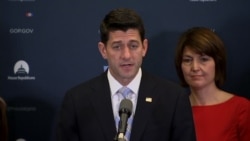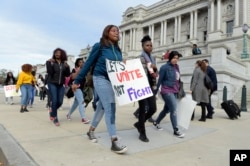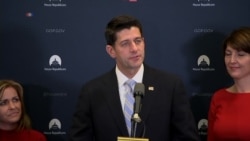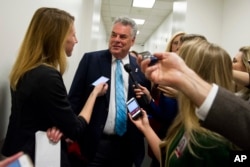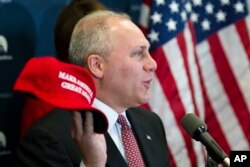Signs of the long, divisive presidential contest that nearly tore the Republican Party apart were nowhere to be seen Tuesday on Capitol Hill.
Republican members of the House of Representatives easily renominated Paul Ryan to be their leader. In January, the new Congress will confirm him as speaker for his first full term.
"This entire conference is unified and we are so eager to get to work with the president-elect," Ryan told reporters following the closed-door Republican conference.
But the elated postelection mood for Republicans on the Hill showed cracks as nearly 1,000 Washington high school students marched to the Capitol, protesting Donald Trump's election, and criticism of his appointment of Steve Bannon, former executive chairman of the far-right-leaning Breitbart News, intensified.
In an open letter to Trump, Democratic Representative David Cicilline of Rhode Island wrote that the "appointment of Stephen Bannon, whose ties to the white nationalist movement have been well-documented, directly undermines your ability to unite the country."
As of midday Tuesday, the letter had 137 House Democrats as co-signers, but no House Republican supporters.
U.S. Senate Democratic leader Harry Reid stood on the Senate floor Tuesday and demanded that Trump rescind Bannon's appointment, saying Bannon was someone who had been praised by white supremacists and had made anti-Semitic remarks.
Reid said many Americans believed it was now OK to physically assault blacks, Muslims and Hispanics because of Trump's "bullying and aggressive" behavior during the campaign.
"Our president is supposed to make people feel safe," Reid said. "Healing the wounds he's inflicted will take more than words."
In an interview with CBS's 60 Minutes Sunday, Trump said he was saddened to learn of attacks carried out in his name and had two words for the perpetrators: "Stop it."
WATCH: Ryan on Working with Trump on Ambitious Republican Agenda
Looking forward
Ryan brushed off Bannon's past criticism in an earlier media availability Tuesday, saying he was not looking backward but forward. House Republicans said little about Bannon or the letter, focusing instead on a prospect that seemed unlikely just seven days ago: control of the White House and all of Congress.
"This is as unified as I've seen the party," Representative Peter King of New York told reporters after the leadership nominations, saying the Never Trump movement no longer existed. "I don't think there's any of them around anymore — there's Always Trumpers. I didn't support Donald Trump in the beginning either, but I think those who came along in stages were all impressed by the campaign he ran."
King said he didn't have any opinions about Bannon and would wait until the whole story about Trump's choice for chief White House strategist came out.
Republican Representative Charlie Dent of Pennsylvania told reporters he had braced for much bigger losses on election night, expecting House Republicans to lose as many as 20 seats or more. Instead, Republicans only lost six seats, swept up in Trump's victory.
Dent, who said he did not know Bannon, told reporters Trump's transition team would need to focus on "getting good, strong, quality people to fill those national security spots. I think that's the biggest challenge. The opportunities for him right now on are transportation, infrastructure, tax reform."
New signs of unity
The unified mood began early in the day as House Republicans convening for their first postelection weekly conference found a familiar sight on each seat: a red-and-white "Make America Great Again" hat. Many members left the meeting wearing the Trump campaign's signature hat, demonstrating a solidarity that had been in doubt until the Republican nominee's historic surprise win over Democratic nominee Hillary Clinton last week.
"Welcome to the dawn of a new, unified Republican government," Ryan told reporters after the morning meeting.
Ryan's position as speaker was widely assumed to be in jeopardy if Trump lost the presidential election, following a chaotic campaign season in which the Republican from Wisconsin walked a fine line between endorsing the nominee of his party and distancing himself from Trump's more controversial statements.
Those days seemed forgotten, though, as Ryan greeted reporters for his first postelection press availability on Capitol Hill.
"If we're going to put our country back on the right track, we have to go bold, and we have to go big," said Ryan, who unveiled "A Better Way" back in June — a six-point legislative road map that tackles poverty, health care and tax reform, among other issues.
"There are going to be a lot more things made in America," said Representative Steve Scalise of Louisiana, holding up one of the hats, as he told reporters the first 100 days of a Trump administration would be crucial in getting the economy back on track.
Republican dissent
There was one major Republican voice of dissent Tuesday, and it came from one of the most influential members of the GOP: Arizona Senator John McCain.
The powerful head of the Armed Services Committee criticized Trump's stated desire for another reset of U.S. relations with Russia.
McCain called Russian President Vladimir Putin, who has also called for a reset with the U.S., someone who has rejoined Syria's Bashar al-Assad in his "barbaric war" against the Syrian people.
Putin has "plunged his country into tyranny, murdered his political opponents, invaded his neighbors, threatened America's allies and attempted to undermine America's elections," McCain said.
A reset of relations with Russia would leave the U.S. complicit in Putin's and Assad's butchery of the Syrian people, McCain said. He called it an unacceptable price for a great nation like the United States.
Trump made no secret during the campaign of his admiration of Putin as a strong leader.
Funding government
One of the immediate concerns moving forward will be funding the government after a continuing resolution expires December 9.
"Those are decisions that are being made with the transition team; none of those have been made yet. We are now sitting down with the Trump administration-in-waiting, along with our colleagues, to come up with a game plan," Ryan said.
As Republicans presented a unified front, House Democrats met just down the hallway for a much more introspective meeting. Representative Tim Ryan, a seven-term congressman from Ohio, confirmed Monday that he was interested in challenging current leader Nancy Pelosi of California for the top Democratic leadership spot.
"We've been through hell," Pelosi told members, who ended up delaying their own leadership vote until November 30, after Congress returns from a Thanksgiving holiday break.




